How Apple survived the flawgic-filled 2010s, butterflies and all
It's been a wild decade. Ten years ago, Apple was perched at what was imagined to be the peak of iOS, surrounded by Windows PC vendors, Android phone makers, and a chirping brood of analysts and pundits all tweeting the perils Apple faced-- now that its competition was about to get Really Serious. Incredibly, these clowns-of-a-feather are still making their honking sounds together ten years later.
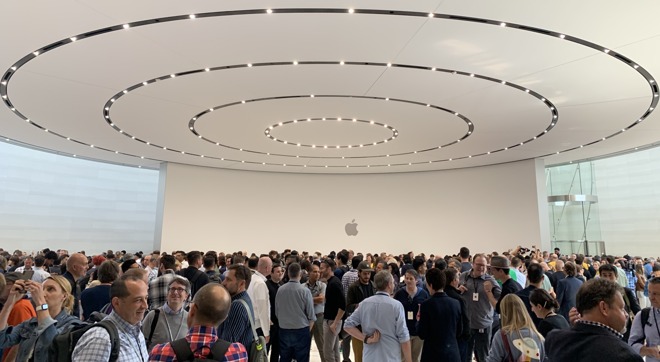
A giant target above every product unveiled in the Steve Jobs Theater, Apple Park
Over the last decade, it started with Steve Jobs unveiling iPad, a tablet with a comically unworkable name that didn't run Adobe Flash and very importantly "wasn't a real computer." It was supposedly fated to be overwhelmed by cheap, simple Android tablet commodity--or perhaps expensive, complicated Windows Tablet commodity.
There was no data supporting either contention, but it seemed "plausibly truthy" to journalists that the company that successfully launched macOS X, iPods, and iPhones in the 2000s was surely going to fail in the 2010s to all the companies that were unable to compete with it over the decade of the 2000s--because, hey, remember the 1990s?
After Jobs passed away, the contempt that had targeted every aspect of his vision for tablets was turned around, creating a mythology that Apple couldn't possibly exist without him.
Yet every subsequent decision made under Tim Cook was held up as something "Jobs would never have approved," even though the same criticisms were invented when Jobs was alive. It's as if every month is a new stage in the same game, where the object is to tear down everything Apple builds.
Still, the reality is that all of the contempt and outrage that these Angry Birds can catapult in Apple's direction has been entirely ineffectual--apart from steeling Apple and refining its products to the point of being impossible to compete against. Nowhere is that more evident than across the five-year arc of the MacBook butterfly keyboard.
Those same people are also now insisting that their anecdotal stories-- and bizarre advice to buy a known to be less reliable Microsoft Surface notebook instead-- were the key drivers in inducing Apple to rethink its keyboard design within the last six months.
Surely, if any customers were listening to these grave depictions of Apple's butterfly keyboards being terrible to the point of dysfunctional, it should have had some material impact on Apple's global sales. We should even see some movement to Surface, the business Microsoft has been desperately trying to get off the ground over the last decade.
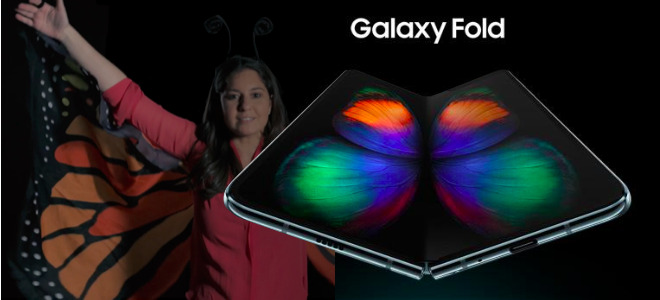
The Wall Street Journal preferring biased theatrics to data-driven reporting didn't fix MacBook keyboards
What was the full impact of Joanna Stern's advice in the Wall Street Journal, delivered in both print and in an easy-to-watch video drama format? Apparently nothing beyond some social media "likes."
Apple's sales of Macs during the Wall Street Journal "Butterfly Extermination" summer quarter reached $7 billion in sales. Apple noted that across its full fiscal year 2019, which also ended in September, "we generated the highest annual revenue ever from our Mac business."
The company did point out that its current-quarter Mac results were a "tough comparison to last year's fourth quarter." That's a nice way of saying that it sold even more Macs in the same quarter last year. However, it noted that was because last year, it had "updated both models of MacBook Pro."
So Apple's sales of Macs are hitting all-time highs this year, and the worst news one can scratch up is that its sales peaked even higher at the launch of mid-2018 butterfly MacBook Pro models, the fourth year of Apple selling butterfly keyboards.
By 2018, it was widely discussed that the butterfly keyboard design-- which Apple had first introduced on the Retina MacBook in 2015-- had experienced some unquantified rash of failures, and had also delivered a less popular feel for some users.
It's difficult to significantly change any part of the experience of a popular product and not get negative feedback over it, but clearly some people experienced awful problems, with multiple failures and the hassle of dealing with repairs more than once.
But after four years, this was a well-reported subject among Mac buyers; "well-reported" in the sense of being loudly and stridently stated to the point where there was broad consciousness of the matter. It was not "well-reported" qualitatively, as nobody seemed to be interested in the facts.
Instead, bloggers were fighting each other to shout out lamentations of their afflictions as loudly and dramatically as possible, with the Wall Street Journal certainly taking the cake, belatedly this spring, in terms of pure drama, complete with Stern posing in a butterfly costume.
We also noted, "keyboard failure percentages for 2016 and 2017 'butterfly' MacBooks specifically were unchanged from the first year and beyond, and there has been no surge of people seeking repairs after Apple launched its keyboard repair program, despite significant media reports concerning problems with the butterfly keyboard and publicizing the repair program.
"Since the 2017 MacBook Pro launched with a revised butterfly design, repair service data is very clear that the keyboards it used were better from a reliability standpoint. Failure rates on 2018 MacBook keyboards have also been lower than on the initial crop from 2016, but about the same as they were with 2017 MacBooks."

Apple developed a new mechanism, not without reason
The bloggers who were really committed to their cause could dismiss these facts by making up logic suggesting that maybe people were suffering in silence, or buying cans of air to blow debris out of their keyboards on their own.
But the larger reality that can't be explained away is that Apple's sales of Macs are clearly growing, surging last year at the launch of new 2018 butterfly MacBook Pros and reaching a new peak this year right as Apple introduced its enhanced mid-2019 butterfly 13 and 15 inch MacBook Pro models.
That sales peak occurred before Apple's launch of the newest 16-inch non-butterfly model, which was widely speculated to address its keyboard feel.
One can opine about their personal preferences in keyboard feel, and it's perfectly legitimate to express a preference for keys with deeper travel and so on. But the most popular claim that activist bloggers were making was that Apple's keyboards were defective and that people were not buying them.
That's not a fact subject to opinion. Anyone saying that potential buyers have been racing to leave Apple to get competing notebooks from other vendors is simply wrong. It's not just incorrect, it's a $7 billion lie.
The most absurd, overreaching version of that lie is the asinine claim that any significant number of potential MacBook buyers were picking up Surface models over the keyboard issue. Microsoft's entire gamut of Surface tablet and/or notebook sales over the last decade have been miserable, insufficient to successfully launch Windows RT, and then rarely poking above its stagnant run rate of $1 billion in revenues across the last seven years.
Pure sycophants at the Verge and elsewhere have characterized this terrible performance as "importantly reaching" $1 billion quarters, but this pure hogwash. Surface is a middling failure that barely makes any money and costs a lot for Microsoft to perpetuate.
Selling like Windows Phone is not good no matter how many bloggers try to paint a smiley face on it.
But more to the point of Stern's influence and command over audiences from her multimedia pulpit at the Wall Street Journal in that after she insisted that MacBook buyers should go out and buy a Surface model instead, Microsoft's Surface sales dropped 4 percent over the previous quarter.
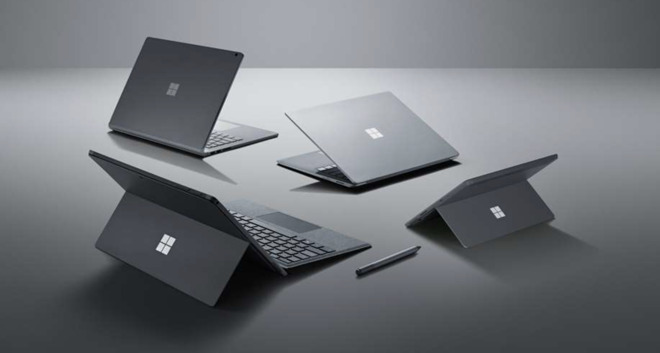
If the butterfly keyboard had driven buyers to Surface, the shift should have materialized in sales
Sales did fall. It was a crisis for Apple. It required a radical intervention by Steve Jobs to restore Apple's reputation in notebooks.
Much more recently, Apple has also experienced very real troubles with modern MacBooks in this very decade. Incredibly, the same people who are working hardest to blow up the butterfly keyboard issue like to insist that all would be well if Apple were contentedly still making the 2015 MacBook Pro.
Frequent Apple-nag Marco Arment even declared the third-generation 2012-2015 MacBook Pro "the best laptop ever made," which sounds like a compliment until you realize he was writing about the previous generation of models in 2017. Arment actually called it "the peak of Jobs' vision for the Mac," an implication that Apple will never exceed the era of Jobs' greatness. In fact, he literally wrote that the design "hasn't been (and may never be) surpassed."
Beyond the fact that Thunderbolt 2, a couple of slow USB-A ports, and MagSafe 2 have all been clearly superseded by the all-around far superior, much faster, much more capable, and more flexible Thunderbolt 3 with USB-C connectors, the reality is that Apple experienced significant battery issues back then, too, resulting in a major recall and even a "Galaxy Note 7" style warning that users should quietly stop using them and step away in case they caught on fire. Not Apple's finest machine experience by a long shot.
That too is puzzling because Apple started out this decade shipping out MacBook Pros with Nvidia GPUs up until 2012, only to run into massive GPU failures and expensive repair programs that were far worse than the butterfly keyboard. It's hard to accurately determine exactly how much impact these GPU failures had on the company's sales and brand reputation, but Apple's Mac sales did level off in 2012 after a decade of consistent growth.
One could also attribute the plateauing Mac sales of the current decade to the rise of iPad, which clearly changed things for PCs in general and likely ate into Mac sales as well. But the narrative that today's butterfly keyboards are killing the MacBook brand and causing buyers to race to Microsoft's Surface, and that yesterday's models were nothing but wonderful and had more pure-Jobs in them is all just horseshit lies.
It's an embarrassment to the tools who think they are so sharp for tightening the screws on Apple when they're really just good at rough, repeated chiseling.
Yet back in 2010, Apple was also supposed to be in an untenable position. It was "doomed" to be stuck selling its premium hardware in markets where cheap commodity was assumed to have already won. Jobs, the company's charismatic founder, was growing seriously ill. What could possibly save a company where everything of value was flowing solely out of one man?
Over the past decade I've written an increasingly confident annual take on what was going on that year: 2010, 2011, 2012, 2013, 2014, 2015, 2016, 2017, 2018, and 2019. Compare that to the general consensus of analysts and bloggers.
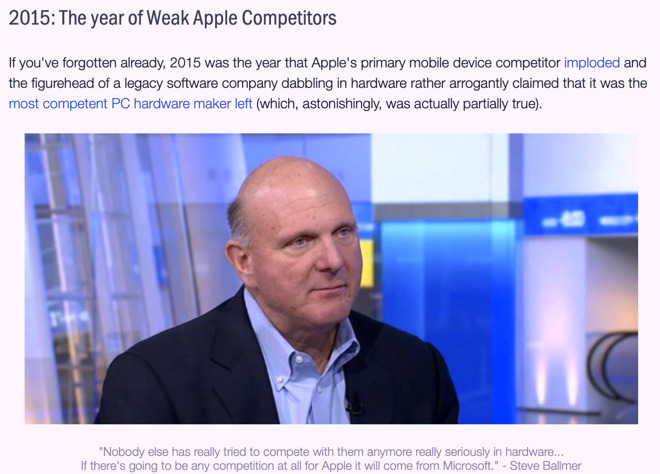
In 2010, pundits were still imagining that iPhone would face some sort of competition from Microsoft's new Windows Phone and perhaps even webOS. An equally pressing problem imagined for Apple's iPhone ten years ago was the threat of 4G LTE-- which Android phones were introducing and which Apple wouldn't deliver until the end of 2012.
Anyone interested in how the story of 5G is going to end might want to review the prequel. It's riveting and-- spoiler alert-- in the end, everyone was straight-up wrong.
The App Store was also ostensibly at risk. Google was already credited with having "won" smartphones, and its chairman Eric Schmidt was about to predict that real soon now, developers would prioritize Android over iOS in building original apps.
Alexa, read me a story about lethal threats to the App Store at the hands of consortiums of incompetent companies partnering around an over-blown technology based on a copy of Apple's work. Android, not Windows!
In the same way that mobile phones were supposed to destroy Apple's iPod business, pundits were now claiming that netbooks would destroy Macs unless Apple didn't rush to build $300 Mac netbooks. Then, after initially mocking iPad at launch, pundits quickly pivoted to the idea that everyone else was going to "walk right in" and take over tablets by offering all the things Apple wasn't aware tablets needed to do.
That included adding real computer complexity for all the people who were used to using Windows PCs, and building support for Adobe Flash for all the rich content users needed.
Analysts were also insisting that Apple needed to build $2,000 television sets running iOS, but somehow also needed to introduce iPhones priced below $300 because at its current prices it wouldn't sustain growth or be able to compete with cheap Android phones.
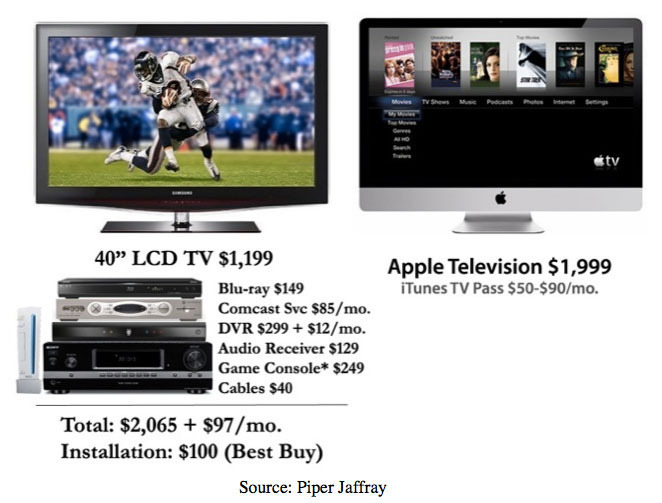
Wow, how crazy
All these years later, they still clutch onto the idea that first Samsung, then Moto, LeEco, Xiaomi, Oppo, and now Huawei are obviously going to be taking away Apple's iPhone sales-- obviously!-- because they offer cheaper handsets, and clearly that's what has driven sustainable phone success over the past decade. Pay no attention to the line of dead Android corpses, this time it's real. Because 5G.
This criticism would sound more intelligent if it weren't coming from people who also professed their love for purely awful tiny keyboards on smartphones ten years ago, and who currently love the middling membrane keyboards paired with tablets. They even get excited about CES prototypes for mobile devices that project a virtual keyboard.
My diagnosis here is Apple Derangement Syndrome.
After Apple released its "Magic Keyboard" for the latest MacBook Pro, Medium blogger Owen Williams-- who is essentially the Adrian Kingsley-Hughes of Evan Spences-- published the incendiary piece "Apple Has Been Gaslighting Us for Years."
Williams' claim of being emotionally manipulated to the verge of insanity by Apple's lies rings a bit false, however. He actually gaslights his own audience by writing, "It's absurd that Apple could get away with selling faulty computers for so long."
Yeah, that sure is absurd! Apple keeps selling more MacBooks despite all the posturing Williams been publishing about how incredibly defective and downright dysfunctional every MacBook Pro has supposedly been since 2016. Yet no discernible impact on the market at all. That's curious because when Samsung screws up a product, as it did with Galaxy Note 7 or the Galaxy S5, S6, S7, S8, S9 and S10, its sales fall precipitously and buyers leave and don't come back.
Why is the market responding to incompetence by Samsung but not Apple? Sure is a puzzle for the ages. Another puzzle: last year, Williams insists that he "switched to the Surface Book 2, after being a loyal MacBook user for years, and haven't looked back since."
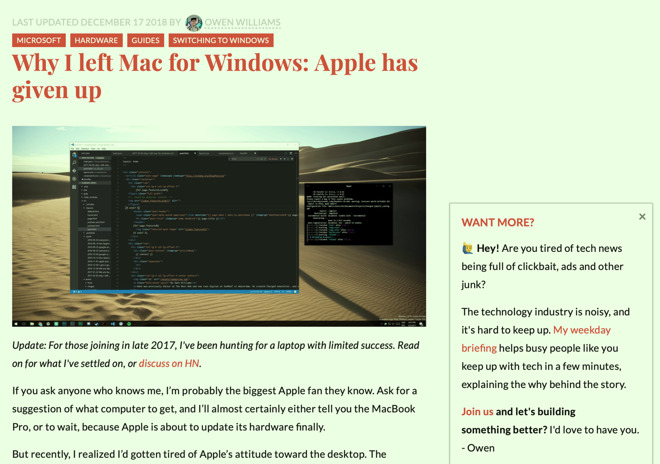
Owen Williams has been leaving Apple since Yosemite died in 2014
A few weird things about this. First of all, in the very next sentence of his lengthy piece entirely focused on MacBooks he is literally looking back again: "I won't lie -- the new MacBook Pro is tempting because it features a laundry list of things I had hoped would come to the machine years ago." Williams, you are looking back.
But more importantly, before Williams claimed to leave the Mac for a Surface Book 3 last spring, he earlier claimed to have left Apple for Windows sometime earlier, writing that "the progress in macOS land has basically been dead since Yosemite, two years ago."
In fact, he has separately claimed in various articles to have left the Mac for a Razr gaming laptop, then an Eve Windows tablet, and then a Dell notebook, meaning he was so fed up with the price of a MacBook that he had to buy four different, not-inexpensive Windows machines within just two years. He's still looking back.
Maybe the problem in sustaining a working relationship here isn't the maker of the notebook you can't stop looking at. And technically, at this point, Williams, you are leaving Windows for Windows.
The fire of complaints has made Apple strong and resilient. Responsively listening to customers has created a powerful brand and strong product satisfaction ratings. But Apple needs real, smart criticism, not just honking sounds and jingo chants from bloggers seeking to get hearted for being daring enough to repeat what everyone else is saying.

A giant target above every product unveiled in the Steve Jobs Theater, Apple Park
Desperately digging for doom
In just a few weeks, a new decade of the 2020s will begin. What will this mean for Apple? Reading the work of bloggers, you might get the impression that the company remains permanently troubled, or as they say, "doomed," due to a variety of imagined problems that never seem to actually materialize.Over the last decade, it started with Steve Jobs unveiling iPad, a tablet with a comically unworkable name that didn't run Adobe Flash and very importantly "wasn't a real computer." It was supposedly fated to be overwhelmed by cheap, simple Android tablet commodity--or perhaps expensive, complicated Windows Tablet commodity.
There was no data supporting either contention, but it seemed "plausibly truthy" to journalists that the company that successfully launched macOS X, iPods, and iPhones in the 2000s was surely going to fail in the 2010s to all the companies that were unable to compete with it over the decade of the 2000s--because, hey, remember the 1990s?
After Jobs passed away, the contempt that had targeted every aspect of his vision for tablets was turned around, creating a mythology that Apple couldn't possibly exist without him.
Yet every subsequent decision made under Tim Cook was held up as something "Jobs would never have approved," even though the same criticisms were invented when Jobs was alive. It's as if every month is a new stage in the same game, where the object is to tear down everything Apple builds.
Still, the reality is that all of the contempt and outrage that these Angry Birds can catapult in Apple's direction has been entirely ineffectual--apart from steeling Apple and refining its products to the point of being impossible to compete against. Nowhere is that more evident than across the five-year arc of the MacBook butterfly keyboard.
The butterfly affected
In the wake of Apple's new 16 inch MacBook Pro, Twitter reads like a catfight of various personalities desperately trying to take credit for discrediting Apple's butterfly MacBook keyboards, as if that's all it took to engineer a series of improvements that could deliver a better feeling, more resilient keyboard.Those same people are also now insisting that their anecdotal stories-- and bizarre advice to buy a known to be less reliable Microsoft Surface notebook instead-- were the key drivers in inducing Apple to rethink its keyboard design within the last six months.
Surely, if any customers were listening to these grave depictions of Apple's butterfly keyboards being terrible to the point of dysfunctional, it should have had some material impact on Apple's global sales. We should even see some movement to Surface, the business Microsoft has been desperately trying to get off the ground over the last decade.

The Wall Street Journal preferring biased theatrics to data-driven reporting didn't fix MacBook keyboards
What was the full impact of Joanna Stern's advice in the Wall Street Journal, delivered in both print and in an easy-to-watch video drama format? Apparently nothing beyond some social media "likes."
Apple's sales of Macs during the Wall Street Journal "Butterfly Extermination" summer quarter reached $7 billion in sales. Apple noted that across its full fiscal year 2019, which also ended in September, "we generated the highest annual revenue ever from our Mac business."
The company did point out that its current-quarter Mac results were a "tough comparison to last year's fourth quarter." That's a nice way of saying that it sold even more Macs in the same quarter last year. However, it noted that was because last year, it had "updated both models of MacBook Pro."
So Apple's sales of Macs are hitting all-time highs this year, and the worst news one can scratch up is that its sales peaked even higher at the launch of mid-2018 butterfly MacBook Pro models, the fourth year of Apple selling butterfly keyboards.
By 2018, it was widely discussed that the butterfly keyboard design-- which Apple had first introduced on the Retina MacBook in 2015-- had experienced some unquantified rash of failures, and had also delivered a less popular feel for some users.
It's difficult to significantly change any part of the experience of a popular product and not get negative feedback over it, but clearly some people experienced awful problems, with multiple failures and the hassle of dealing with repairs more than once.
But after four years, this was a well-reported subject among Mac buyers; "well-reported" in the sense of being loudly and stridently stated to the point where there was broad consciousness of the matter. It was not "well-reported" qualitatively, as nobody seemed to be interested in the facts.
Instead, bloggers were fighting each other to shout out lamentations of their afflictions as loudly and dramatically as possible, with the Wall Street Journal certainly taking the cake, belatedly this spring, in terms of pure drama, complete with Stern posing in a butterfly costume.
An absolute refusal to consider facts
This spring, AppleInsider uniquely reported details of real-world repair data from service partners going all the way back to 2012. We found that despite sales of "about the same number of MacBook Pro sales year-over-year, the total number of service calls were lower for both the 2016 and 2017 MacBook Pro in their first years of service, compared to earlier models, even when including keyboard failures."We also noted, "keyboard failure percentages for 2016 and 2017 'butterfly' MacBooks specifically were unchanged from the first year and beyond, and there has been no surge of people seeking repairs after Apple launched its keyboard repair program, despite significant media reports concerning problems with the butterfly keyboard and publicizing the repair program.
"Since the 2017 MacBook Pro launched with a revised butterfly design, repair service data is very clear that the keyboards it used were better from a reliability standpoint. Failure rates on 2018 MacBook keyboards have also been lower than on the initial crop from 2016, but about the same as they were with 2017 MacBooks."

Apple developed a new mechanism, not without reason
The bloggers who were really committed to their cause could dismiss these facts by making up logic suggesting that maybe people were suffering in silence, or buying cans of air to blow debris out of their keyboards on their own.
But the larger reality that can't be explained away is that Apple's sales of Macs are clearly growing, surging last year at the launch of new 2018 butterfly MacBook Pros and reaching a new peak this year right as Apple introduced its enhanced mid-2019 butterfly 13 and 15 inch MacBook Pro models.
That sales peak occurred before Apple's launch of the newest 16-inch non-butterfly model, which was widely speculated to address its keyboard feel.
One can opine about their personal preferences in keyboard feel, and it's perfectly legitimate to express a preference for keys with deeper travel and so on. But the most popular claim that activist bloggers were making was that Apple's keyboards were defective and that people were not buying them.
That's not a fact subject to opinion. Anyone saying that potential buyers have been racing to leave Apple to get competing notebooks from other vendors is simply wrong. It's not just incorrect, it's a $7 billion lie.
The most absurd, overreaching version of that lie is the asinine claim that any significant number of potential MacBook buyers were picking up Surface models over the keyboard issue. Microsoft's entire gamut of Surface tablet and/or notebook sales over the last decade have been miserable, insufficient to successfully launch Windows RT, and then rarely poking above its stagnant run rate of $1 billion in revenues across the last seven years.
Pure sycophants at the Verge and elsewhere have characterized this terrible performance as "importantly reaching" $1 billion quarters, but this pure hogwash. Surface is a middling failure that barely makes any money and costs a lot for Microsoft to perpetuate.
Selling like Windows Phone is not good no matter how many bloggers try to paint a smiley face on it.
But more to the point of Stern's influence and command over audiences from her multimedia pulpit at the Wall Street Journal in that after she insisted that MacBook buyers should go out and buy a Surface model instead, Microsoft's Surface sales dropped 4 percent over the previous quarter.

If the butterfly keyboard had driven buyers to Surface, the shift should have materialized in sales
This all happened before
The butterfly keyboard brouhaha of the last few years pales in comparison to real issues Apple has experienced with its notebooks. Long ago, when Apple was among the first notebook makers to begin using modern Lithium-Ion batteries, it experienced a real rash of defective cells sold by Sony that caused PowerBooks to self destruct in the mid-1990s.Sales did fall. It was a crisis for Apple. It required a radical intervention by Steve Jobs to restore Apple's reputation in notebooks.
Much more recently, Apple has also experienced very real troubles with modern MacBooks in this very decade. Incredibly, the same people who are working hardest to blow up the butterfly keyboard issue like to insist that all would be well if Apple were contentedly still making the 2015 MacBook Pro.
Frequent Apple-nag Marco Arment even declared the third-generation 2012-2015 MacBook Pro "the best laptop ever made," which sounds like a compliment until you realize he was writing about the previous generation of models in 2017. Arment actually called it "the peak of Jobs' vision for the Mac," an implication that Apple will never exceed the era of Jobs' greatness. In fact, he literally wrote that the design "hasn't been (and may never be) surpassed."
Beyond the fact that Thunderbolt 2, a couple of slow USB-A ports, and MagSafe 2 have all been clearly superseded by the all-around far superior, much faster, much more capable, and more flexible Thunderbolt 3 with USB-C connectors, the reality is that Apple experienced significant battery issues back then, too, resulting in a major recall and even a "Galaxy Note 7" style warning that users should quietly stop using them and step away in case they caught on fire. Not Apple's finest machine experience by a long shot.
Nostalgia for Nvidia
The short memories and attention spans of bloggers and anonymous commenters who are going for maximum outrage and trying to express the most seething contempt for today's Apple is always on display when the company releases any new product, but the fist-shaking rage really gets vertical when there isn't an option for buying an Nvidia GPU.That too is puzzling because Apple started out this decade shipping out MacBook Pros with Nvidia GPUs up until 2012, only to run into massive GPU failures and expensive repair programs that were far worse than the butterfly keyboard. It's hard to accurately determine exactly how much impact these GPU failures had on the company's sales and brand reputation, but Apple's Mac sales did level off in 2012 after a decade of consistent growth.
One could also attribute the plateauing Mac sales of the current decade to the rise of iPad, which clearly changed things for PCs in general and likely ate into Mac sales as well. But the narrative that today's butterfly keyboards are killing the MacBook brand and causing buyers to race to Microsoft's Surface, and that yesterday's models were nothing but wonderful and had more pure-Jobs in them is all just horseshit lies.
It's an embarrassment to the tools who think they are so sharp for tightening the screws on Apple when they're really just good at rough, repeated chiseling.
Against all odds
Apple's fiercest critics have been stuck in the infinite loop of cognitive dissonance that Apple is precariously perched on the brink of imminent failure, and solidly has been for the last decade. Nobody is more critical than the super-fans, who nostalgically pine for the good old days of company's once-glorious past--before Tim Cook changed everything and made the American icon of capitalist enterprise "all about money."Yet back in 2010, Apple was also supposed to be in an untenable position. It was "doomed" to be stuck selling its premium hardware in markets where cheap commodity was assumed to have already won. Jobs, the company's charismatic founder, was growing seriously ill. What could possibly save a company where everything of value was flowing solely out of one man?
Over the past decade I've written an increasingly confident annual take on what was going on that year: 2010, 2011, 2012, 2013, 2014, 2015, 2016, 2017, 2018, and 2019. Compare that to the general consensus of analysts and bloggers.

In 2010, pundits were still imagining that iPhone would face some sort of competition from Microsoft's new Windows Phone and perhaps even webOS. An equally pressing problem imagined for Apple's iPhone ten years ago was the threat of 4G LTE-- which Android phones were introducing and which Apple wouldn't deliver until the end of 2012.
Anyone interested in how the story of 5G is going to end might want to review the prequel. It's riveting and-- spoiler alert-- in the end, everyone was straight-up wrong.
The App Store was also ostensibly at risk. Google was already credited with having "won" smartphones, and its chairman Eric Schmidt was about to predict that real soon now, developers would prioritize Android over iOS in building original apps.
Alexa, read me a story about lethal threats to the App Store at the hands of consortiums of incompetent companies partnering around an over-blown technology based on a copy of Apple's work. Android, not Windows!
In the same way that mobile phones were supposed to destroy Apple's iPod business, pundits were now claiming that netbooks would destroy Macs unless Apple didn't rush to build $300 Mac netbooks. Then, after initially mocking iPad at launch, pundits quickly pivoted to the idea that everyone else was going to "walk right in" and take over tablets by offering all the things Apple wasn't aware tablets needed to do.
That included adding real computer complexity for all the people who were used to using Windows PCs, and building support for Adobe Flash for all the rich content users needed.
Analysts were also insisting that Apple needed to build $2,000 television sets running iOS, but somehow also needed to introduce iPhones priced below $300 because at its current prices it wouldn't sustain growth or be able to compete with cheap Android phones.

Wow, how crazy
All these years later, they still clutch onto the idea that first Samsung, then Moto, LeEco, Xiaomi, Oppo, and now Huawei are obviously going to be taking away Apple's iPhone sales-- obviously!-- because they offer cheaper handsets, and clearly that's what has driven sustainable phone success over the past decade. Pay no attention to the line of dead Android corpses, this time it's real. Because 5G.
Odds against all
Unsurprisingly, Apple will face the scalding rage of critics no matter what it does. When it worked to enhance the butterfly keyboard, critics fumed. When it replaced it entirely, they fumed more and cited this as proof the company had persecuted us all with a too-thin keyboard.This criticism would sound more intelligent if it weren't coming from people who also professed their love for purely awful tiny keyboards on smartphones ten years ago, and who currently love the middling membrane keyboards paired with tablets. They even get excited about CES prototypes for mobile devices that project a virtual keyboard.
My diagnosis here is Apple Derangement Syndrome.
After Apple released its "Magic Keyboard" for the latest MacBook Pro, Medium blogger Owen Williams-- who is essentially the Adrian Kingsley-Hughes of Evan Spences-- published the incendiary piece "Apple Has Been Gaslighting Us for Years."
Williams' claim of being emotionally manipulated to the verge of insanity by Apple's lies rings a bit false, however. He actually gaslights his own audience by writing, "It's absurd that Apple could get away with selling faulty computers for so long."
Yeah, that sure is absurd! Apple keeps selling more MacBooks despite all the posturing Williams been publishing about how incredibly defective and downright dysfunctional every MacBook Pro has supposedly been since 2016. Yet no discernible impact on the market at all. That's curious because when Samsung screws up a product, as it did with Galaxy Note 7 or the Galaxy S5, S6, S7, S8, S9 and S10, its sales fall precipitously and buyers leave and don't come back.
Why is the market responding to incompetence by Samsung but not Apple? Sure is a puzzle for the ages. Another puzzle: last year, Williams insists that he "switched to the Surface Book 2, after being a loyal MacBook user for years, and haven't looked back since."

Owen Williams has been leaving Apple since Yosemite died in 2014
A few weird things about this. First of all, in the very next sentence of his lengthy piece entirely focused on MacBooks he is literally looking back again: "I won't lie -- the new MacBook Pro is tempting because it features a laundry list of things I had hoped would come to the machine years ago." Williams, you are looking back.
But more importantly, before Williams claimed to leave the Mac for a Surface Book 3 last spring, he earlier claimed to have left Apple for Windows sometime earlier, writing that "the progress in macOS land has basically been dead since Yosemite, two years ago."
In fact, he has separately claimed in various articles to have left the Mac for a Razr gaming laptop, then an Eve Windows tablet, and then a Dell notebook, meaning he was so fed up with the price of a MacBook that he had to buy four different, not-inexpensive Windows machines within just two years. He's still looking back.
Maybe the problem in sustaining a working relationship here isn't the maker of the notebook you can't stop looking at. And technically, at this point, Williams, you are leaving Windows for Windows.
Apple needs criticism
Apple certainly shouldn't be coddled and exempted from criticism just because it is performing well commercially. I also like to write about how little criticism the company got during its Golden Age, when the Apple of the early 90s was treated the way Google has been over the past decade, with the same results of being lulled into dysfunction, the toleration of bad management, and a series of increasingly embarrassing product and initiative failures.The fire of complaints has made Apple strong and resilient. Responsively listening to customers has created a powerful brand and strong product satisfaction ratings. But Apple needs real, smart criticism, not just honking sounds and jingo chants from bloggers seeking to get hearted for being daring enough to repeat what everyone else is saying.





Comments
I wonder how long Alphabet will be able to continue to make branded phones? They lack Apple’s scale of production to move the technology forward in a substantial way and I doubt these phones are a big source of profit for them compared to their primary services.
Desperately digging for doom
That also perfectly describes a certain cadre of you-know-who-you-ares right here on AppleInsider Forums. Actually it appears that this piece could have been written specifically to confront that same cadre of resident naysayers and doomsayers that rush to piss on anything Apple does or releases. From TV+, to Apple advertising, to iOS, macOS, tvOS, iPadOS, watchOS, any and all products this crowd is always on attack while trying to claim the high ground by saying it’s objective criticism. Nothing could be further from the truth. Proof of that lies with their reaction to any rebuttal of their negativity, the denouncement of those challenges as fanboyism. Apparently the way to achieve forum street cred is to lambast Apple at every turn. We see it daily here.
No reason for this overly long article to exist. Terrible headings, over-dramatizing facts, handpicking random ingredients just to prove a point nobody is asking for.
lol
DED’s criticism of the media, and tech pundits in particular, is well warranted and pretty dead-on. Your comments on it every time are basically, “I don’t like this! When is the next one?”
The measure of a company’s integrity is no different than the measure of an individual’s integrity - how do they react to adversity and challenges to their success, health, and survival? Apple has shown itself to be very resilient and able to stay focused and on-task, no matter what. Imagine the dumpster fire that would be ensue if Tim Cook took to Twitter at every sleight or negative media story about Apple. Tim Cook is the calm in the storm and steady hand at the helm. When problems arise, and they always will, they analyze the issue, make necessary changes, verify the results, and move on. It’s never about saving face or winning the argument, it’s about doing what’s right for the customer and all of Apple stakeholders.
We’re living in a society that’s obsessed with an illusion that everyone and everything is part of a giant zero sum game where winners can only exist if there are losers. Those who attack Apple’s success probably believe that they are somehow moving themselves into the “winning” column by denigrating Apple’s accomplishments or vocally obsessing over Apple’s foibles. These losers simply don’t realize that life doesn’t work that way - they are still losers regardless of what Apple does. Fortunately, Apple knows that their success is primarily driven by their own efforts, accomplishments, and commitment to their customers. It’s an incredibly simple concept but seems so hard to grasp by so many.
I’m not even going to try to read the whole thing. These are so tiresome. They’re more annoying than all the advertising “articles”.
What exactly is DED’s investment in Apple that he’s constantly making these long, defensive, rambling editorials to protect (actually, shape) Apple’s image? Is it just emotional, or does it go deeper?
My investment in Apple is in how I’ve converted all my computer productivity to Apple’s platform. It’s a legit consumer investment in hardware and workflow (time and money), where Apple doing right with their products is more important to me than their wealth and public image, by far.
The only suffering I’m seeing of Apple’s public image is a very subtle and slow (and still far behind the full reality) degradation of image. Only someone who is emotionally invested in Apple’s image, and who is extremely insecure about that investment, should be bothered by the actual media output, because Apple should be getting worse publicity than it gets.
The actual and very small (and slow to grow) PR injury being sustained is entirely self-inflicted. Apple have been doing worse with their software stability/reliability, availability of consistent raw power (and thermal design), and even their much talked about ease of use, since around 2013. “The media”, like most tech people and most users, is convinced that bugs are inevitable and ever present in software. “The media”, again, like most people, doesn’t know enough about user interface design or how users OUGHT to be treated to comment in an informed manner about Apple’s failures since 2013 (at best, there was a tiny flare up of reports of GUI expert designers explaining why they thought iOS 7 was a horrible redesign, and this had a net zero effect on Apple’s image in 99% of the minds who care about Apple in some form or other).
I’m NOT getting my impression of Apple from some “problematic media”; I’m getting it first hand from experience with the product in place as my primary (and CHOSEN) platform (as well as witnessing Apple’s prior unwillingness to maintain its foothold in the professional market, which they’ve suddenly made extremely unbalanced efforts in with the bulk-potential-customer-dumping new target price for Mac Pro machines).
If you think that anything is going wrong with some mass perception of Apple, you need only look to Apple (and these pro-Apple forums) to explain it. There’s only a tiny segment of Apple users who are consciously aware of the actual problems, and they’re not being poisoned by any rogue media efforts. Apple are doing it all on their own.